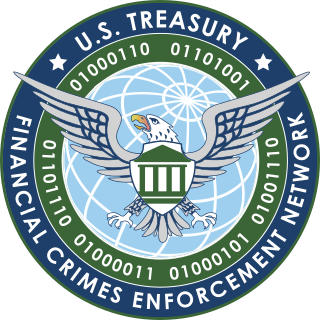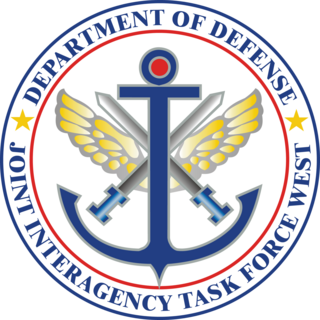Related Research Articles

The Federal Bureau of Investigation (FBI) is the domestic intelligence and security service of the United States and its principal federal law enforcement agency. Operating under the jurisdiction of the United States Department of Justice, the FBI is also a member of the U.S. Intelligence Community and reports to both the Attorney General and the Director of National Intelligence. A leading U.S. counter-terrorism, counterintelligence, and criminal investigative organization, the FBI has jurisdiction over violations of more than 200 categories of federal crimes.

The USA PATRIOT Act was a landmark Act of the United States Congress, signed into law by President George W. Bush. The formal name of the statute is the Uniting and Strengthening America by Providing Appropriate Tools Required to Intercept and Obstruct Terrorism Act of 2001, and the commonly used short name is a contrived acronym that is embedded in the name set forth in the statute.

The Department of the Treasury (USDT) is the national treasury of the federal government of the United States where it serves as an executive department. The department oversees the Bureau of Engraving and Printing, and the U.S. Mint; these two agencies are responsible for printing all paper currency and coins, while the treasury executes its circulation in the domestic fiscal system. The USDT collects all federal taxes through the Internal Revenue Service; manages U.S. government debt instruments; licenses and supervises banks and thrift institutions; and advises the legislative and executive branches on matters of fiscal policy. The department is administered by the secretary of the treasury, who is a member of the Cabinet. The treasurer of the United States has limited statutory duties, but advises the Secretary on various matters such as coinage and currency production. Signatures of both officials appear on all Federal Reserve notes.

The Posse Comitatus Act is a United States federal law signed on June 18, 1878, by President Rutherford B. Hayes which limits the powers of the federal government in the use of federal military personnel to enforce domestic policies within the United States. The Act was passed as an amendment to an army appropriation bill following the end of Reconstruction and was updated in 1956 and 1981.

The Financial Crimes Enforcement Network (FinCEN) is a bureau of the United States Department of the Treasury that collects and analyzes information about financial transactions in order to combat domestic and international money laundering, terrorist financing, and other financial crimes.

The Freedom of Information Act (FOIA), 5 U.S.C. § 552, is a federal freedom of information law that requires the full or partial disclosure of previously unreleased information and documents controlled by the United States government upon request. The act defines agency records subject to disclosure, outlines mandatory disclosure procedures, and defines nine exemptions to the statute. The act was intended to make U.S. government agencies' functions more transparent so that the American public could more easily identify problems in government functioning and put pressure on Congress, agency officials, and the president to address them. The FOIA has been changed repeatedly by both the legislative and executive branches.

The Homeland Security Act (HSA) of 2002, was introduced in the aftermath of the September 11 attacks and subsequent mailings of anthrax spores. The HSA was cosponsored by 118 members of Congress. The act passed the U.S. Senate by a vote of 90–9, with one Senator not voting. It was signed into law by President George W. Bush in November 2002.
The USA PATRIOT Act was passed by the United States Congress in 2001 as a response to the September 11, 2001 attacks. It has ten titles, each containing numerous sections. Title II: Enhanced Surveillance Procedures granted increased powers of surveillance to various government agencies and bodies. This title has 25 sections, with one of the sections containing a sunset clause which sets an expiration date, December 31, 2005, for most of the title's provisions. This was extended twice: on December 22, 2005 the sunset clause expiration date was extended to February 3, 2006 and on February 2 of the same year it was again extended, this time to March 10.

The following are controversial invocations of the USA PATRIOT Act. The stated purpose of the Act is to "deter and punish terrorist acts in the United States and around the world, to enhance law enforcement investigatory tools, and for other purposes." One criticism of the Act is that "other purposes" often includes the detection and prosecution of non-terrorist alleged future crimes.
Title VI: Providing for victims of terrorism, public safety officers and their families is the sixth of ten titles which comprise the USA PATRIOT Act, an anti-terrorism bill passed in the United States after the September 11, 2001 attacks. It provides aid to the families of Public Safety Officers who were injured or killed in terrorist attacks, and amends the Victims of Crime Act of 1984.
Title VII: Increased information sharing for critical infrastructure protection is the seventh of ten titles which comprise the USA PATRIOT Act, an anti-terrorism bill passed in the United States after the September 11, 2001 attacks. Title VII has one section. The purpose of this title is to increase the ability of U.S. law enforcement to counter terrorist activity that crosses jurisdictional boundaries. It does this by amending the Omnibus Crime Control and Safe Streets Act of 1968.
The USA PATRIOT Act was passed by the United States Congress in 2001 as a response to the September 11, 2001 attacks. It has ten titles, each containing numerous sections. Title IV: Protecting the Border aims to prevent terrorism in the USA through immigration regulations. The provisions of the title generally increase the difficulty of entering the country for those known to have, or suspected of having, terrorist intent.
Title IX: Improved Intelligence is the ninth of ten titles which comprise the USA PATRIOT Act, an anti-terrorism bill passed in the United States after the September 11, 2001 attacks. It amends the National Security Act of 1947 to require the Director of Central Intelligence (DCI) to establish requirements and priorities for foreign intelligence collected under the Foreign Intelligence Surveillance Act of 1978 and to provide assistance to the United States Attorney General to ensure that information derived from electronic surveillance or physical searches is disseminated for efficient and effective foreign intelligence purposes.

The following is a section summary of the USA PATRIOT Act, Title II. The USA PATRIOT Act was passed by the United States Congress in 2001 as a response to the September 11, 2001 attacks. Title II: Enhanced Surveillance Procedures gave increased powers of surveillance to various government agencies and bodies. This title has 25 sections, with one of the sections containing a sunset clause which sets an expiration date, 31 December 2005, for most of the title's provisions. On 22 December 2005, the sunset clause expiration date was extended to 3 February 2006.
In United States law, a roving wiretap is a special kind of wiretap permit that follows the surveillance target. For instance, if a target attempts to defeat a regular wiretap by throwing away a phone and acquiring a new one, another surveillance order would usually need to be applied for to tap the new one. A "roving wiretap", once authorized, follows the target rather than a specific phone device, and would give the surveilling body permission to tap second and subsequent phones without applying for new surveillance orders.

The history of the USA PATRIOT Act involved many parties who opposed and supported the legislation, which was proposed, enacted and signed into law 45 days after the September 11 terrorist attacks in 2001. The USA PATRIOT Act, though approved by large majorities in the U.S. Senate and House of Representative, was controversial, and parts of the law were invalidated or modified by successful legal challenges over constitutional infringements to civil liberties. The Act had several sunset provisions, most reauthorized by the USA PATRIOT Improvement and Reauthorization Act of 2005 and the USA PATRIOT Act Additional Reauthorizing Amendments Act. Both reauthorizations incorporated amendments to the original USA PATRIOT Act, and other federal laws.
The National Language Service Corps (NLSC) is a civilian Corps of multilingual volunteers who are readily available to serve the federal government by providing foreign language services as required. NLSC Members use their language skills to facilitate communications with other speakers of their language and to serve as a bridge to their community and the federal government. To date, Members have supported the government in assignments that have included interpretation, translation as well as providing cultural and regional knowledge and expertise to government agencies.

Joint Interagency Task Force West is a standing United States military joint task force with the mission of combating drug-related transnational organized crime in the Indo-Asia-Pacific. JIATF West's area of responsibility (AOR) is that of United States Indo-Pacific Command (USINDOPACOM). JIATF West is one of two Joint Interagency Task Forces with a counter-narcotics mission. The other is Joint Interagency Task Force South. The task force is run as USPACOM's "executive agent" for counterdrug activities providing support to partner nation law enforcement. Approximately 166 active duty and reserve U.S. military forces; Department of Defense civilian employees; contractors; and U.S. and foreign law enforcement agency personnel are members of the task force.
The National Defense Authorization Act (NDAA) for Fiscal Year 2013 is a United States federal law which specifies the budget and expenditures of the United States Department of Defense for fiscal year 2013. The full title is An Act to Authorize Appropriations for fiscal year 2013 for military activities of the Department of Defense, for military construction, and for defense activities of the Department of Energy, to prescribe military personnel strengths for such fiscal year, and for other purposes. This law has been assigned the number PL 112–239.

The USA Freedom Act is a U.S. law enacted on June 2, 2015, that restored and modified several provisions of the Patriot Act, which had expired the day before. The act imposes some new limits on the bulk collection of telecommunication metadata on U.S. citizens by American intelligence agencies, including the National Security Agency. It also restores authorization for roving wiretaps and tracking lone wolf terrorists. The title of the act is a ten-letter backronym that stands for Uniting and Strengthening America by Fulfilling Rights and Ensuring Effective Discipline Over Monitoring Act of 2015.
References
- 1 2 3 "National Virtual Translation Center". fbi.gov. Federal Bureau of Investigation . Retrieved June 30, 2021.
- ↑ USA PATRIOT Act (U.S. H.R. 3162, Public Law 107-56), Title IX, Sec. 907.
- ↑ Intelligence Authorization Act for Fiscal Year 2003 (U.S. H.R. 4628, Public Law 107-306)